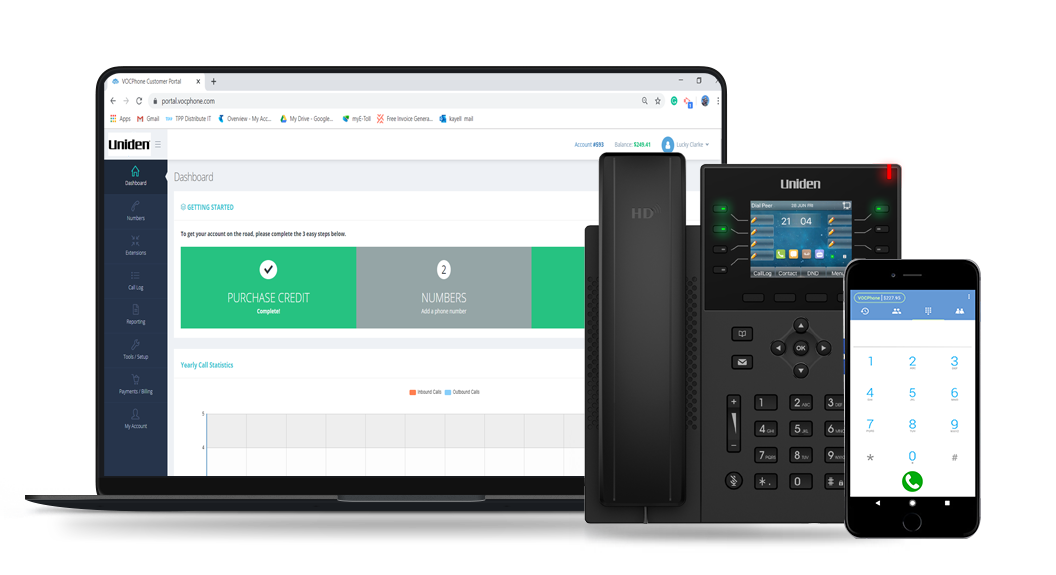
Future-proof your communication with a VoIP phone system for a small business in Australia
Transform your business communications and prepare for the future of work.

Transform your business communications and prepare for the future of work.
With 72% of business leaders stating that communication is key to increased productivity, staying connected is more crucial than ever. Adopting a VoIP phone system for a small business in Australia can be a game-changer in future-proofing communications.
VoIP technology transforms voice calls into data packets, transmitting them over the internet rather than traditional phone lines. This shift offers many benefits, from cost savings to enhanced flexibility and scalability.
Let’s delve into VoIP phone systems and explore how this technology can empower small businesses across Australia to adapt, grow, and thrive in an increasingly digital marketplace.

VoIP systems grow seamlessly with your business, allowing you to add or remove lines with ease as your needs change. This scalability ensures your communication infrastructure can adapt to your business's evolving requirements, whether you're expanding to new locations, hiring seasonal staff, or streamlining operations. Unlike traditional phone systems that often require physical hardware changes, VoIP solutions can be adjusted through simple software updates, saving time and resources. This flexibility also extends to features and capabilities, allowing you to activate or deactivate advanced functionalities as your business needs evolve.
By leveraging your internet connection, VoIP reduces communication costs across multiple areas. You'll save on long-distance and international calls, hardware expenses, and ongoing maintenance fees. Traditional phone lines often come with hefty installation costs and fixed monthly charges, regardless of usage. In contrast, VoIP systems typically offer more transparent, usage-based pricing models. This cost-effectiveness allows small businesses to allocate resources to other critical areas, fostering growth and innovation. Additionally, the reduced need for on-site hardware minimises the risk of obsolescence, protecting your investment.
VoIP systems enable employees to work from anywhere with an internet connection, supporting the growing trend of remote and hybrid work models. This flexibility ensures business continuity during disruptions. Employees can access their work phone lines, voicemail, and other communication features from their smartphones, tablets, or laptops, maintaining professional communication anywhere. This capability is valuable for businesses looking to attract top talent who value work-life balance. Features like virtual phone numbers allow businesses to establish a local presence in different geographic areas without the need for physical offices.
VoIP systems offer a wealth of features that were once the domain of large enterprises with expensive PBX systems. These include call forwarding, voicemail-to-email transcription, auto-attendants, call queuing, and high-quality video conferencing. Advanced analytics provide insights into customer interactions, enabling data-driven decision-making. Features like interactive voice response (IVR) systems can handle routine inquiries automatically and these tools boost productivity and enhance professionalism, enabling small businesses to compete effectively with larger enterprises and meet evolving customer expectations for efficient communication.
Employees can turn smartphones or computers into work phones with VoIP apps, reducing hardware costs and enhancing flexibility.
Remote workers can use their office numbers for outbound calls, presenting a consistent, professional image to clients and partners.
VoIP systems often include high-quality video conferencing and virtual meeting rooms, facilitating team collaboration and interactions.
VoIP significantly reduces costs for long-distance and international calls, benefiting businesses with geographically dispersed teams.
VoIP's mobility features allow employees to manage their communications efficiently, supporting flexible schedules and work-life balance.
At Uniden, we offer a range of VoIP phone systems for small businesses in Australia. With decades of experience, we understand the unique challenges faced by local enterprises.
Our VoIP solutions combine reliability, affordability, and advanced features to help businesses improve communications. From sleek desk phones to robust business phone systems, Uniden provides the tools necessary to streamline operations and enhance customer interactions.

Revolutionise your small business communications with the help of Uniden.
Yes, VoIP phone systems are generally very reliable for small businesses in Australia. The quality and stability of your VoIP service depend largely on your internet connection. With Australia's improving internet infrastructure, including the National Broadband Network (NBN), most businesses can enjoy high-quality VoIP services. It's important to ensure you have a stable and fast internet connection for optimal performance.
VoIP phone systems are typically more cost-effective than traditional phone lines. The exact savings depend on your business's specific needs and usage patterns. Costs are reduced through lower call rates, especially for long-distance and international calls, and decreased hardware and maintenance expenses.
In most cases, yes. Number portability allows you to transfer your existing phone number to your new VoIP service. This process, known as porting, ensures business continuity and prevents the need to update your contact information with clients and partners. Your VoIP service provider can guide you through the porting process, which usually takes a few days to complete.
VoIP phone systems offer a wide range of features beneficial for small businesses. These often include call forwarding, voicemail-to-email, auto-attendants, call recording, video conferencing, and integration with CRM systems. Advanced features like IVR (Interactive Voice Response), call analytics, and mobile apps for remote work are also commonly available, allowing small businesses to access enterprise-level communication tools.